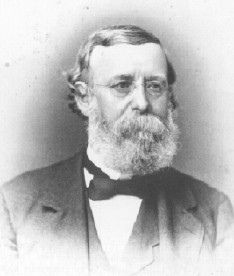Traveling with Henry Ward Beecher in England in June, Rochester Theological Seminary Baptist educator and abolitionist John H. Raymond joins Beecher in making stirring anti-slavery speeches in Manchester, Glasgow, Edinburgh, Liverpool, and London, in an effort to prevent England from siding with the Confederacy.
While Beecher is the main draw, Raymond also delivers speeches. Later, Beecher recounts of Raymond:
Our visit, you will recollect, was made in the summer of 1863, just before the capture of Vicksburg and the expulsion of Lee from Pennsylvania after the Battle of Gettysburg. The prejudice against the North, among all the upper classes in England, was undisguised. The “common people,” the laboring classes, were friendly. Your father and I were met on every side with abundant proffers of social kindness from men who openly avowed a wish–that the Union might be dissolved. A breakfast was given us in London by the Congregational clergymen and laymen of London and vicinity. More than 100 sat down at the tables. When it was my turn to speak, I laid the case of my country before the gentlemen with some plainness of speech and fervor of manner. Thinking that the effect might be better if my views were corroborated by a self-contained and scholarly man, not given to undo feeling and speech, I had Dr. Raymond called out. His first sentence was like an explosion, and his speech, a tremendous outburst of indignation at the lukewarmness of English friends and of fervent patriotism, such as I had never heard from him before. It electrified his audience and me too! I never set him up again to make a cool and conservative speech upon the war for the extinction of slavery and the preservation of the Union! If my speech had been fervid, his was red hot; if mine was a summer thunderstorm, his was a tropical tornado!
But he had a magnificent power of indignation! Gentle, genial, and little apt to be aroused by anger, yet when he did confront meanness and dishonorable conduct, he had a fury of wrath that consumed it to the uppermost.
Meanwhile, back in the states the 54th Massachusetts Infantry Regiment, the first African-American regiment formed during the war, is stationed along the Union-controlled Sea Islands of South Carolina, preparing for battles sure to come. The 54th, a regiment chaplained by a Baptist minister and comprised of many Baptist soldiers, is an inspiration to the tens of thousands of free blacks within the Union-controlled area of the South Carolina coast. Here, slavery has already been vanquished, emancipation already achieved. The presence of the 54th brings hope that freedom will be extended much further.
Sources: “John Raymond, Electric Abolitionis,” Vassar Encyclopedia (link); B Company 54th Massachusetts Voluntary Infantry Regiment (link)



